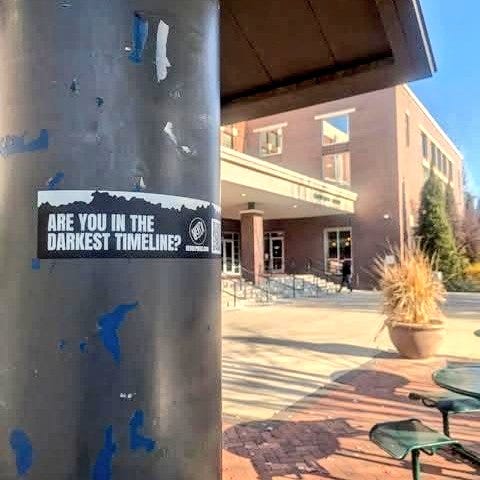
How do you kill the God of Mischief? In Norse legend, Loki was bound in a cave, imprisoned for eternity as poison dripped onto his face from the fangs of a snake. On the eve of Ragnarök, the end of the world, he is destined to escape and wreak havoc one last time. In real life, just as in mythology, you can’t keep a good trickster down… Now, Scotland’s very own Loki is back.
My final guest of 2024 is Darren McGarvey, celebrated author, broadcaster, activist and rapper. He joins me to discuss his new album Not Funded by Creative Scotland, his magnum opus under the rap alias Loki, an identity he has inhabited for decades, and long into a troubled past.
We talk about his roots in rap; why it’s time to go out with a bang; how it feels to retire from the competitive, often fractious world of Scottish hip-hop, and the genre’s under-representation in the wider culture.
We discuss the much-maligned figure of the ‘ned’, and what their exclusion means for a generation of disaffected young men, and we get a preview of the themes of his forthcoming third book, Trauma Industrial Complex: Trauma and Oversharing in an Age of Lived Experience (which is available for pre-order now).
If you’re in Glasgow, you can still get tickets for the album launch at Ivory Blacks on 28th December if you move fast. Darren is the author of Poverty Safari: Understanding the Anger of Britain’s Underclass, winner of the Orwell Prize in 2018, and The Social Distance Between Us: How Remote Politics Wrecked Britain.
He’s also the presenter of several high-profile TV shows for the BBC, including Loki’s History of Scottish Hip-Hop (not available via iPlayer, but handily archived here); The State We’re In, Class Wars and Addictions.
The album Not Funded By Creative Scotland is available for pre-order.
Links and music from the episode

We kick off by talking about the crisis of masculinity, and how this connects to the rise of gurus and demagogues. I mention the excellent podcast from Helen Lewis, The New Gurus (the first part of her series Influenced, which also includes the tremendous Helen Lewis Has Left The Chat). I also mention her appearances on Matthew Bourne and Chris Kavanagh’s Decoding The Gurus, and Darren’s appearance with Russell Brand on his show Under The Skin back in 2018.
We move on to talk about Eminem’s influence on Darren’s early work as a rapper. The track below is the perfect example of what Darren accurately describes as “upcycled shame”, where the trauma of poverty, family breakdown, addiction and male aggression are explored with dark humour, irreverence, and a disregard for conventional morals.
Discussing early Loki records, we briefly touch on Summer Knows… A Darker Shade of Grey (with Scatabrainz), which many fans consider to be Loki’s masterpiece. It’s a stunning document of the energy, political concerns and aesthetic intricacies of the Scottish hip-hop scene, at the time (and to this day) almost completely under-represented or entirely missing from cultural narratives about Scotland and its people.
Whatever preconceptions you might bring to the table about the accent, attitudes or subject matter of Scottish rap, Summer Knows… stands as a remarkable artistic achievement, and deserves to be listened to in its entirety.
We go on to talk about battle rap, and its formative influence on Darren as a young man. Below, you can watch a compilation of some of Loki’s most devastating punchlines, from Scottish battle channel and events organisers IRN BRZ. I am not much of a believer in content warnings, but for the sake of decorum, be aware these clips contain some of the most savage, no-holds-barred, wildly offensive material you’re ever likely to hear.
You really get a sense of the energy in the room, which Darren and I discuss in relation to ‘toxic masculinity’ in the episode. Darren also mentions his release Petty Shit as an example of battle rap skills applied in an album context.
As we discuss Darren’s criticisms of Creative Scotland — the state funding body for artists — he brings up a few key figures from the Scottish music scene. One is Steg G, producer and DJ, and a principal architect of the Scottish hip-hop scene for over 20 years.
He also mentions Sunny Govan, a community radio station in Glasgow who do amazing outreach and charity work, while offering a platform for young people to host and produce their own shows. Steg G helps Sunny Govan administer the Scottish Hip-Hop Bursary, an award for emerging and established artists in the genre to fund small projects, supported by Creative Scotland.
It’s a step in the right direction, as Darren says — but without better representation for working class artists and artforms in the actual infrastructure of the arts establishment, it’s unlikely much will change in the ‘house style’ the state tends to fund and support.
Even that ‘house style’ — focused on nostalgic ideas about Scottish identity and culture — has been under threat lately, with Creative Scotland engulfed by a series of scandals in 2024. We briefly discussed the experience of poet Jenny Lindsay, who was targeted by a cabal of activists — including Creative Scotland employees — in a prolonged campaign of abuse and harassment intended to end her career, both before and after the publication of her book Hounded: Women, Harm and the Gender Wars.
We didn’t touch on it, but there was also a major furore this year over the funding of what the BBC described as a ‘hardcore sex show’, to the tune of nearly £85,000. This drove a minor moral panic among Scotland’s right-of-centre media.
Creative Scotland’s statement on the withdrawal of funding from that project focused on the company’s “breach of the conditions of funding award” by intending to include non-simulated sex acts in the performance. This was undercut by separate statements defending the decision to fund the project, which drew focus from accusations of corruption in the way the show’s funding was approved.
Creative Scotland’s failure and unwillingness to address the persistence and dominance of networks of privilege and influence are the true problems, for Darren. These networks create a culture which ensures an almost total lack of access to funding and opportunity for working class artists.
Until Scotland’s arts establishment confronts this problem honestly by giving meaningful power to champions of working class culture like Steg G, and organisations like Sunny Govan, little will change. Instead we’re stuck with the predictable, curated spectacle of The List’s ‘Hot 100’, which Darren correctly identifies as a “lifestyle magazine” feature, rather than a meritocratic or representative look at Scotland’s thriving art subcultures.
I briefly mentioned the work of Gavin F. Brewis, an academic working on a major thesis about ‘ned’ culture in Scotland. The figure of the ‘ned’ is a long-standing caricature of a white male from a deprived background, inherently criminal. As we mention on the episode, neds are rarely seen in Scottish media and culture unless they are a cautionary tale, or the butt of a joke. Gavin unpacks these caricatures and biases in a way that complements and expands upon themes in Darren’s work. Here’s Gavin on the Scottish podcast Tickling The Void, discussing his work, and on an episode of Darren’s podcast Common People.
Darren mentions a few Scottish hip-hop artists during the course of the episode. Here are a few to check out if you want to explore further: Gasp, battle rap pioneer, king of the dark joke, and Scotland’s undisputed dark magister of horrorcore rap. You Call That Radio host Mark McGee, aka Jackal Trades, rapper, promoter, and lead singer of Glasgow legends The Girobabies.
More familiar to international listeners perhaps, there’s acclaimed record label LuckyMe, early stalwarts of the Scottish hip-hop club scene in the 2000s, who launched internationally renowned musicians Rustie and Hudson Mohawke.
Darren also mentions some of his long-term friends and collaborators, like Sace Lockhart. He also mentions Mista Defy, an original member of the legendary progenitors of Scottish rap, II Tone Committee, and MOG, widely considered one of the most important voices in the scene’s early history.
I also mention Solareye, Scotland’s foremost hip-hop academic, and frontman of Stanley Odd. This year he was involved in a wildly successful and acclaimed ‘gig theatre’ show, A Giant on the Bridge, which will hopefully tour to a much wider audience next year. Find out more about his academic work here.
There are many more artists in the genre worth checking out — have a listen to this Spotify playlist below selected by Steg G to discover more.
My playlist here features many of the same artists, alongside a mix of other genres. Darren’s also kind enough to drop my name in the episode… for those that don’t know, my rap avatar is Texture.
Darren mentions an intervention he made on X / Twitter in 2022, calling for the resignation of the Scottish minister Joe Fitzpatrick, responsible for the policy on drug deaths. I can’t find the tweet (thanks, Elon), but here are some remarks he made at the time, and coverage of his eventual resignation, including a cringe-inducing TV interview.
Scotland’s high rate of drug deaths is not a topic Darren’s prepared to let go. Here’s a more recent piece he wrote for UnHerd, and an earlier feature on the topic he produced for Sky News. You can also watch Darren interview Gabor Maté, one of the world’s foremost experts on addiction and recovery.
This leads us finally into a discussion of his next book, Trauma Industrial Complex, and his process, which often starts with a spoken word show, podcasts and features for news; then moves through the writing of a book, and eventually, on to TV shows on the same themes. It was great to get an insight into Darren’s process, from which I’ve learned a lot as an admirer and observer. Here’s the Fringe show I mentioned (you can hear me asking a question from the audience towards the end).
Until next time…
That’s it for us here at Strange Exiles, until the new year. I’ll be back in January with a new episode, and some ‘Redux’ versions of episodes from our first two seasons.
You can read all about these in my roundup of 2024, which also includes a few of my cultural highlights from the year, and a thank you to all of my subscribers.
-Bram, Glasgow, December 2024
Support my work:
Explore my writing: linktr.ee/bramegieben
Read my book: linktr.ee/thedarkesttimeline
Follow @strangeexiles for updates on Instagram and Twitter

















Share this post